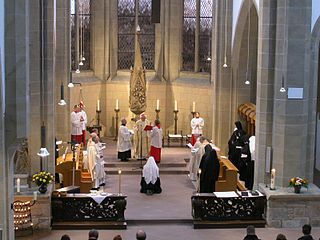Related Research Articles
Celibacy is the state of voluntarily being unmarried, sexually abstinent, or both, usually for religious reasons. It is often in association with the role of a religious official or devotee. In its narrow sense, the term celibacy is applied only to those for whom the unmarried state is the result of a sacred vow, act of renunciation, or religious conviction. In a wider sense, it is commonly understood to only mean abstinence from sexual activity.
Monasticism, also called monachism or monkhood, is a religious way of life in which one renounces worldly pursuits to devote oneself fully to spiritual work. Monastic life plays an important role in many Christian churches, especially in the Catholic, Orthodox and Anglican traditions as well as in other faiths such as Buddhism, Hinduism, and Jainism. In other religions, monasticism is criticized and not practiced, as in Islam and Zoroastrianism, or plays a marginal role, as in modern Judaism.

Scholastica was an Italian Christian hermit and the sister of Benedict of Nursia. She is traditionally regarded as the foundress of the Benedictine nuns.

Thomas George Thomas, 1st Viscount Tonypandy, was a British politician who served as a member of parliament (MP) and Speaker of the House of Commons from 1976 to 1983. He was elected as a Labour MP.
Religious terrorism is a type of religious violence where terrorism is used as a strategy to achieve certain religious goals or which are influenced by religious beliefs and/or identity.

A hermit, also known as an eremite or solitary, is a person who lives in seclusion. Eremitism plays a role in a variety of religions.

The Ephrata Cloister or Ephrata Community was a religious community, established in 1732 by Johann Conrad Beissel at Ephrata, in what is now Lancaster County, Pennsylvania. The grounds of the community are now owned by the Commonwealth of Pennsylvania and are administered by the Pennsylvania Historical and Museum Commission.

Self-Realization Fellowship (SRF) is a worldwide religious organization founded in 1920 by Paramahansa Yogananda, the Indian guru who authored Autobiography of a Yogi. Before coming to the United States, Yogananda began his spiritual work in India in 1917 and named it Yogoda Satsanga Society of India (YSS). He came to the West in 1920 and in 1925 established SRF's headquarters at Mount Washington, Los Angeles, California. Before his return visit to India in 1935, he legally incorporated SRF in the United States, designating it as the only organization to carry on his work – to care for and disseminate his teachings.

Johann Conrad Beissel was a German-born religious leader who in 1732 founded the Ephrata Community in the Province of Pennsylvania.

Christian monasticism is the devotional practice of Christians who live ascetic and typically cloistered lives that are dedicated to Christian worship. It began to develop early in the history of the Christian Church, modeled upon scriptural examples and ideals, including those in the Old Testament. It has come to be regulated by religious rules and, in modern times, the Canon law of the respective Christian denominations that have forms of monastic living. Those living the monastic life are known by the generic terms monks (men) and nuns (women). The word monk originated from the Greek μοναχός, itself from μόνος meaning 'alone'.

Religious vows are the public vows made by the members of religious communities pertaining to their conduct, practices, and views.

John Michael Talbot is an American Christian musician, author, television presenter and founder of a monastic community known as the Brothers and Sisters of Charity.

Anglican religious orders are communities of men or women in the Anglican Communion who live under a common rule of life. The members of religious orders take vows which often include the traditional monastic vows of poverty, chastity and obedience, or the ancient vow of stability, or sometimes a modern interpretation of some or all of these vows. Members may be laity or clergy, but most commonly include a mixture of both. They lead a common life of work and prayer, sometimes on a single site, sometimes spread over multiple locations. Though many Anglicans are members of religious orders recognized by the Anglican Communion, others may be members of ecumenical Protestant or Old Catholic religious orders while maintaining their Anglican identity and parochial membership in Anglican churches.
New Monasticism is a diverse movement, not limited to a specific religious denomination or church and including varying expressions of contemplative life. These include evangelical Christian communities such as "Simple Way Community" and Jonathan Wilson-Hartgrove's "Rutba House," European and Irish new monastic communities, such as that formed by Bernadette Flanagan, spiritual communities such as the "Community of the New Monastic Way" founded by feminist contemplative theologian Beverly Lanzetta, and "interspiritual" new monasticism, such as that developed by Rory McEntee and Adam Bucko. These communities expand upon traditional monastic wisdom, translating it into forms that can be lived out in contemporary lives "in the world."

Rizong gompa, Gelugpa or Yellow Hat Buddhist monastery is also called the Yuma Changchubling in Ladakh, India. It is situated at the top of a rocky side valley on the north side of the Indus, to the west of Alchi on the way to Lamayuru. It was established in 1831 by Lama Tsultim Nima under the Gelukpa order, at Ri-rdzong. There are 40 monks in the monastery. The monastery is also called "the paradise for meditation" and is noted for its extremely strict rules and standards. The nunnery, located about 2 km from the monastery, is called the "Jelichun Nunnery" or Chulichan (Chomoling), where, at present, 20 nuns reside. It is north of Srinagar-Leh highway & north of Mangyu temple complex.

Emerging since the 19th century, there are several Protestant adherent and groups, sometimes organised as religious orders, which strive to adhere to the teachings and spiritual disciplines of Saint Francis of Assisi.
The Little Brothers of Francis are one of the family of Franciscan orders in the Anglican Communion. They are based in New South Wales, Australia.
A religious brother is a member of a religious institute or religious order who commits himself to following Christ in consecrated life of the Church, usually by the vows of poverty, chastity and obedience. He is usually a layman and usually lives in a religious community and works in a ministry appropriate to his capabilities.
In the Catholic Church, "A religious institute is a society in which members, according to proper law, pronounce public vows, either perpetual or temporary which are to be renewed, however, when the period of time has elapsed, and lead a life of brothers or sisters in common."

A religious sister in the Catholic Church is a woman who has taken public vows in a religious institute dedicated to apostolic works, as distinguished from a nun who lives a cloistered monastic life dedicated to prayer and labor, or a canoness regular, who provides a service to the world, either teaching or nursing, within the confines of the monastery. Nuns, religious sisters and canonesses all use the term "Sister" as a form of address.
References
- ↑ John Michael Talbot (15 October 2009). Reflections on St. Francis. Liturgical Press. p. 138. ISBN 978-0-8146-3302-1 . Retrieved 29 March 2012.
- ↑ W. K. McNeil (2005). Encyclopedia of American gospel music. Psychology Press. p. 393. ISBN 978-0-415-94179-2 . Retrieved 29 March 2012.
- ↑ Stephen A. Marini (2003). Sacred song in America: religion, music, and public culture. University of Illinois Press. p. 254. ISBN 978-0-252-02800-7 . Retrieved 29 March 2012.
- ↑ Marcia Kelly; Jack Kelly (18 August 1998). The whole heaven catalog: a resource guide to products, services, arts, crafts, and festivals of religious, spiritual, and cooperative communities . Bell Tower/One Spirit. p. 17. ISBN 978-0-609-80120-8 . Retrieved 29 March 2012.
- ↑ Patti DeLano (25 November 2008). Arkansas Off the Beaten Path, 9th: A Guide to Unique Places. Globe Pequot. p. 72. ISBN 978-0-7627-4856-3 . Retrieved 29 March 2012.